- Home
- Nick Carter
Checkmate in Rio Page 5
Checkmate in Rio Read online
Page 5
Nick used Marlene Webster's bathtub and scattered some of her perfumed powder on the shelf and floor. Making for the bed, he pulled the blankets awry and dented the pillow. Then, opening a drawer a trifle here and dropping a feminine slipper there, he locked Oscar Johnson away for the night and went back to Room 1107.
For fifteen minutes he practiced the Yoga exercises that enabled him to squeeze out of tight corners and hold his breath for long, precious minutes, then he got into Michael Nolan's bed and slept like a baby.
In the morning he adjusted his beard slightly and went on his way.
The managing editor of Rio's English-language newspaper greeted him cordially. It interested him greatly that the roving reporter for the Washington Herald and stringer for the Amalgamated Press and Wire Service — yes, yes, of course, he had already received their cabled notification — should concern himself with a local crime story.
Nick's tone was grave and he tugged at his beard.
"Of course, you understand, Senhor," he said, in perfectly acceptable Portuguese, "that at the moment my enquiry is confidential. Later, the police. But now — you understand how it is with anyone tracking down a story — one prefers to talk directly with the principals." He smiled deprecatingly. "At least, it has always been my preference to work independently of authority as long as possible."
The editor smiled knowingly.
"But naturally. Newsmen are the same everywhere. But why should you have this interest in a nonentity such as Appelbaum? A curious story, yes, but surely not of importance?"
"Not by itself, perhaps," said Nick. "But I wonder if it has come to your attention that another American, the gem dealer Pierce Langley, has been missing for weeks? And that your own reporter, João de Santos, was acquainted with both of them? It may mean nothing, of course, but there is something a little curious about it, wouldn't you say?" He hoped his own questions didn't sound too curious.
"Our own de Santos? But…" The Editor's eyes narrowed. "How do you know he knew the others?"
Nick sighed sadly. "Appelbaum has family in the States, you see. Quite distant relatives, but he used to write to them. He didn't get around much, apparently, and didn't have much to write about. So he mentioned his friends and the books he enjoyed most, and things like that. Now when he didn't write for some time — well, that's how it all started, you see. And then when his body was discovered, and right after that de Santos was found dead, and Langley turned up missing, well, my office cabled me to look into it."
It was a pretty garbled story, but he did have cables and credentials to back him up. He also had the managing editor's natural interest in João de Santos.
"But Langley! What do you mean, he is missing?"
Nick shrugged. "Neither his home nor his office have the faintest idea where he is, and he's been away for weeks. It may be a purely personal thing, or some highly secret business — who can tell? But I'd like to find out. And I was hoping you could help me. My office seems to think there might be something bigger behind this than meets the eye. Is it possible to check whether any other Americans may be missing? Or mysteriously found dead?"
"But why de Santos?"
"I don't know. I don't know at all. But it might just be that he had stumbled onto a story he wasn't supposed to stumble on."
Nick gave the Editor a shrewd, newshawk-type look.
"What kind of story could that possibly be?"
Nick drew on his imagination and suggested a story that included gun-running and wholesale gem robbery. Of course, he could only guess, being a relative stranger here, but wasn't it possible…? By the time he was finished he almost believed it himself. So did the Editor, at least enough to give him some grudging assistance. He promised to have his staff do a check on missing persons, and he gave Nick the details of the finding of the bodies of Appelbaum and de Santos. Finally, he promised to call Carmen de Santos and suggest that she allow the bearded American reporter to interview her.
"But I can't promise that she will see you," he said, rising to steer Nick to the door of his office. "She is taking this hard, as you can imagine."
"I can understand that," Nick said sympathetically. "But you can assure her that I will take very little of her time and that I have the utmost respect for her feelings. But in the light of what you've just told me, she may not be averse to any effort to clear this thing up. Anyway, I won't call her myself until I've heard from you. She could even call me herself, if she likes. Michael Nolan, Room 1107, Hotel Serrador."
He went back to the hotel, making one brief stop along the way. The Unicorn Bookstore had a sign on the door: closed.
Rooms 1107 and 1109 had been dusted and made up.
He fastened the connecting door and sat down to wait and think things over. Perhaps he should call Carla.
* * *
Rosalind stepped through the wide doors of the National Indian Museum and gave a sigh of relief for the welcome coolness. She stopped near the entrance and looked at the floor plan.
"Indian civilizations of Central and South America… tribes of Brazil, Colombia, Chile, Peru, Mexico and etc. etc. Pueblos… Zunis… Aztecs… Incas… Jivaros… and so on. Habitats, costumes, languages, customs… burial places… sacrificial wells… temples… treasures… conquistadores… well, that did it. Offices? Ground floor, right. But first she'd look around for anything that matched her cram course of the morning. She walked through the marbled foyer and through open double doors into a room lined with glass cabinets of tremendous size.
Anyone looking at her would have seen a nondescript woman of middle height wearing low, sensible shoes and a somewhat unbecoming straight cotton dress. Her hair was pulled back in a bun, and it was curiously lifeless, as though it had never felt the sun. Tiny lines pinched the corners of her eyes and mouth. And her name for the day was Mary Louise Baker. It even made her feel drab.
She looked for company among the glass-encased Indians. There was one bored tourist, male, with flowered shirt; one earnest, youngish couple with notebooks and hoarse voices; one silent youth in urgent need of a haircut; one old lady occupying the only sitting place in sight. It seemed to be the guard's chair, though she did not seem to be the guard.
Rosalind ventured on. It really was rather interesting. The dioramas were marvelously well done and the very eyes of these people of a time long past were curiously alive. Ancient writings and their translations, as well as certain artifacts of particular shape and design, formed the basis for one of Carlos Brenha's obscure monographs on the subject of a lost continent and its survivors. He had written several such papers in his dry, scholarly style, backing up his thesis with comparisons of hieratic writing and careful drawings of exquisitely wrought utensils symbolically inscribed. She had one of these monographs in her capacious pocketbook right now, along with a letter of introduction that had taken her a substantial part of the morning to prepare. The signature alone was a minor masterpiece. Anyone could see at a glance that it was the work of an ageing scholar with a precise mind and a trembling hand.
The corridors seemed to stretch out indefinitely. Each main room led to others, and each of the secondary rooms had offshoots. Above the main floor was a mezzanine, and above that several more floors of open exhibits and glass cases. Museum guards seemed few and far between.
At last, feeling saturated with Indian lore and oppressed by the age-filled silence, she made her way to the ground floor offices.
A nameplate on a door read: OFFICE. PRIVATE. Dr. Eduardo Soares. Dr. Carlos Brenha.
She tapped lightly on the door. No answer. She tapped again. Finally a reedy voice called out impatiently: "Come in! Come in!"
She did. A gaunt, bespectacled man peered from behind a desk piled high with papers, books, ceremonial masks and odd pieces of pottery. The second desk was even more disordered, but it was unoccupied.
"Dr. Brenha?" she asked uncertainly. "Or are you…?"
"Ah! No! Sorry. Very sorry." The man rose clumsily and waved her to a chair.
"Dr. Brenha — unaccountable, the whole thing. Can't understand it! Delighted to see you. You know him? Please sit down. Soares is my name. Curator. Brenha, yes. Strange affair — good man, fine mind. You say you know him? Oh no, of course not. I am Dr. Soares. And you?"
"Mary Louise Baker," she said hesitantly. "Colorado Institute of Indian Studies. I have a letter of introduction to him." Rosalind fumbled inside her pocketbook. "I am here on vacation, but I thought I would take this opportunity…"
"Ah! Too bad." Dr. Soares peered at her intently over his glasses. "I have not seen Brenha for weeks. He is not home, he does not come to work, he did not have an accident, no one knows where he can be. Suddenly one day he did not come in. I am flabbergasted."
"You mean…" Rosalind stared at him. "You mean he just vanished? Surely he's on a trip, a vacation, a visit?"
Soares shook his head energetically.
"Never a trip without elaborate plans. No trip. No visit. Gone!"
"But surely you have checked with the police?"
"But of course! Hospitals, police — morgue. No trace. Terrible! Ill somewhere, perhaps, lost his memory. Absent-minded as we all are, sometimes. But not like that. Bad, bad."
"But that's absolutely incredible! When did you say you last saw him?" Mary Louise Baker's face was pale with sympathy and alarm. "The Institute will be…"
"Here, here it is," said Soares, riffling through papers on his desk and coming up with a calendar. "December 6th. It was a Friday. We are not here for the weekends, of course. Oh! I almost forgot." He peered at her with added interest. "There was someone else asking after Carlos. Anthropologist from Lisbon. Yes. Dr. Tomaz. Nilo Tomaz. Ever hear of him?"
"I'm afraid not," said Rosalind, thinking: Someone else, was there now? Aloud, she said: "Is he still in the city? And is he someone I should have heard of?"
Soares shrugged and flapped a hand. "No, no! I had never heard of him myself. But yes, he is in the city. As a matter of fact he comes here almost every day to work on the inscriptions. He is most interested in the hieratic alphabet and the picture symbols. I take it that this is your interest too?"
Rosalind nodded enthusiastically. "If I could meet this Dr. Tomaz — set up an appointment…"
"No problem. No problem. Funny thing — he first came here just after Brenha wandered off and was very disappointed, like you. He said at the time that he would like to meet anyone else connected with this field. Yes, I do believe he even said that if anyone else came to see Carlos, he would very much like to meet that person!" Soares beamed happily. "And here you are!"
"Yes," murmured Rosalind. "Here I am. Could you tell me where I could locate Dr. Tomaz? Or what time he usually comes here?"
"As a matter of fact," bubbled Soares, flapping enthusiastically, "he's here right now. I saw him come in about twenty minutes ago and set up his things in that little alcove in the back. We can go and meet him right away. Come, let us go!"
He reached out a chivalrous hand to help her to her feet.
"Oh but really," she protested. "Don't you think it's a bit of an imposition while he's working? Wouldn't it be better if you perhaps mentioned me to him, and told me how to get in…"
"Of course not, of course not. I told you he is anxious to meet with colleagues. Come now!"
He almost dragged her down the long passage that led into one of the main halls and off again into another corridor. He must be getting bored with me, she thought, foisting me off on a passing stranger at the first opportunity. She couldn't help wishing that Nick were somewhere near at hand to give her moral support.
"There, now!" said Soares exuberantly.
The last of a series of labyrinthine passages led them into a small alcove almost filled with glass cases containing stone tablets and broken pieces of pottery bearing symbolic inscriptions. A large man sat on a folding stool and looked up with interest as they came in.
He had extremely broad shoulders, and little round eyes that swept over her body as if looking for concealed curves — or weapons.
"Miss Baker, allow me to present Dr. Nilo Tomaz. Dr. Tomaz, Miss Mary… er… Mary Baker of the Colorado Institute. I understand that you two have a mutual interest in my friend Dr. Carlos Brenha."
Unfortunate way of putting it, thought Rosalind.
"Actually, it's just that I have a letter of introduction," she said, smiling tentatively. "I had no intention of disturbing you."
The big man reached out a strong hand and clasped hers.
"Disturbing me? Never! My pleasure!" He smiled broadly.
"There now, there now," said Soares happily. "Just as I said. Now I know you two will have a lot to talk about, so I shall leave you to it." Bobbing and nodding his head, he bustled away between the rows of Indian figures. Under cover of his departure Rosalind sneaked a look at her watch. Please God let Nick come soon and find me. It was a quarter to three.
She looked at Nilo Tomaz and his pile of notebooks. The big man's small eyes bored into hers. Her heart missed a beat. Something was very badly out of place. Of course, everyone has some unexpected weak points, but… At least, she thought, she wouldn't have to worry about her own ignorance of hieratic writing.
The cover of a paperback showed under one of the notebooks. She couldn't read the complete tide, but she had seen the book among others of its kind on a downtown newsstand and she remembered the tide and the cover picture both vividly and clearly.
The book was called Hellhouse of Passion.
Doctor Tomaz, yet.
The man with the lurid taste in leisure reading said:
"Quite right, Miss Baker. We have a great deal to talk about." Something had made his breath quicken.
* * *
Nick looked at his watch. A quarter to three. He'd wait five more minutes, then go to meet Rosalind.
The Journal's managing editor had called him some time ago in Room 1107, Hotel Serrador, to say several interesting things: One, a nightclub owner and a museum curator had also turned up missing. Two, it was quite true that no one seemed to know the whereabouts of gem dealer Pierce Langley. Three, the police had revealed that de Santos' battered camera, found on the hillside in the path of his fall, had proved not to be a camera at all but an ingenious device that fired .22 caliber bullets. None, however, had been fired. Four, he — the editor — had called Carmen de Santos and told her about enquiring reporter Michael Nolan. She had expressed a certain interest, so he had suggested that she contact him at Room 1107, Hotel Serrador.
So far, nothing.
Nick turned over in his mind the little he knew. What the managing editor had told him earlier was that the police were almost certain that de Santos had been murdered. Also, that de Santos had asked for an extension on his vacation and the very day he returned he died. He was not due to contact his office until the following Monday, and he hadn't.
He had come back and fallen right into something, Nick thought. And now it was almost certain that he had been the last to die. Nick was convinced that the order of disappearance was vitally important — but deceptive. De Santos, for instance, could have given away the lot of them and then gone off on vacation enjoying a false sense of security, only to return and fall victim to his own treachery.
But, somehow, Nick didn't think it likely.
Five of the six were now beginning to emerge as individuals, and a list was starting to shape up: Langley and Appelbaum, missing/dead early in the game, about the same time. De Freitas and Brenha, he had just learned, both reported to be missing a few days after Langley's sudden departure for God knows where. João de Santos, recently dead. No report on Maria Cabral at all. He'd have to get into the house somehow.
Funny. He was sure that the de Santos line would have been tapped, the house watched. Maybe he wouldn't have that visitor, after all. Or maybe the visitor would wait until Nick had left.
Ten to three. Better be on his way. Maybe Roz was having better luck.
He was on his feet in one fluid movement and reaching for the do
orknob when he heard a tiny sound. Someone had stopped outside his door.
Someone knocked. Knocked again.
Nick glided silently across the carpet and into a closet. His hand closed around Wilhelmina's comfortable butt.
The front doorknob turned. Something scraped in the lock or past it. The knob rattled again. Nick stepped back in the closet, leaving himself a half-inch crack to see through.
A stranger with a ferrety face and big hands let himself cautiously into Nick's room. One hand closed the front door; the other slid into a side pocket. Sharp eyes peered around and pointed ears twitched with the effort to hear the smallest sound.
Hugo Asks the Questions
Nick waited. Wilhelmina, Hugo and Pierre waited with him, patient and prepared.
Pierre the gas pellet, small but lethal, was not designed for use in confined quarters or public places. He was much too deadly. Hugo, the snap-blade stiletto fashioned with exquisite ingenuity by a disciple of Cellini, was at his best as a swiftly-flung, decisive argument. Wilhelmina the Luger, stripped down to the bare essentials like the hot rod she was, functioned both as a silent persuader and a vicious killer with a bite even worse than her bark.
Wilhelmina was ready.
Ferret-face stepped into the bathroom and came out again immediately. Nick watched him move toward the closet, his eyes darting from closet door to bed to dresser to desk as he walked. Something on the desk made him stop. The page in the portable typewriter was covered with print — an attempt to link the deaths of Appelbaum and de Santos. At the bottom of the page Nick had typed LANGLEY???
The newcomer read the page with interest and then took it out of the typewriter. He put it into an inside pocket and opened the top desk drawer. The big hands were sorting through notebooks and papers bearing the name of Michael Nolan when Nick decided that Ferret had had enough time to prowl.
He stepped silently from his hiding place.

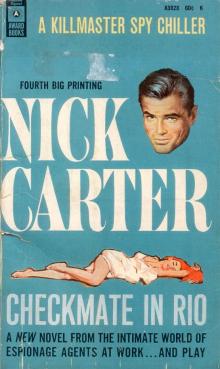 Checkmate in Rio
Checkmate in Rio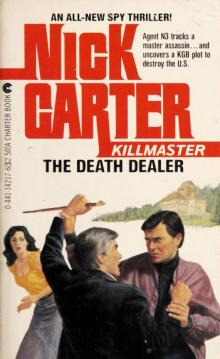 The Death Dealer
The Death Dealer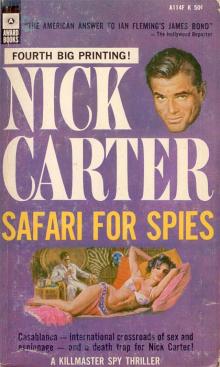 Safari for Spies
Safari for Spies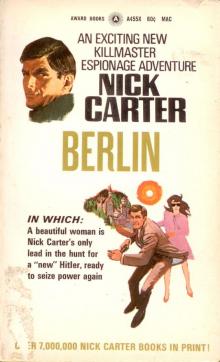 Berlin
Berlin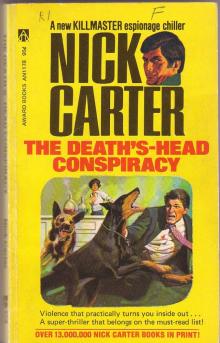 The Death’s Head Conspiracy
The Death’s Head Conspiracy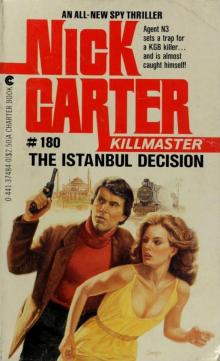 The Istanbul Decision
The Istanbul Decision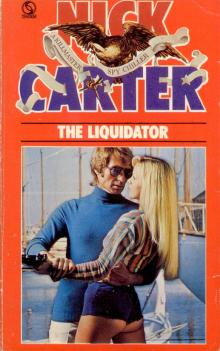 The Liquidator
The Liquidator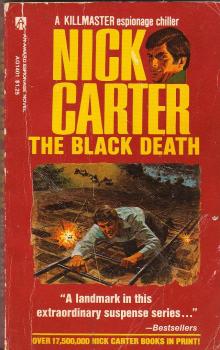 The Black Death
The Black Death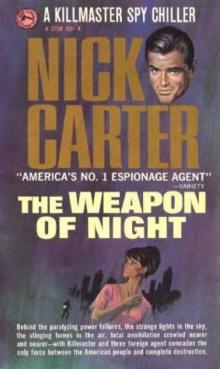 The Weapon of Night
The Weapon of Night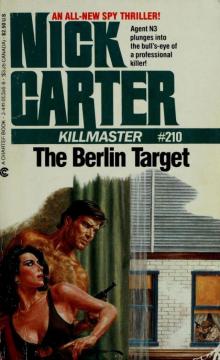 The Berlin Target
The Berlin Target Temple of Fear
Temple of Fear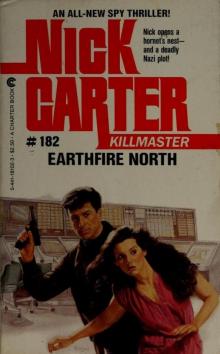 Earthfire North
Earthfire North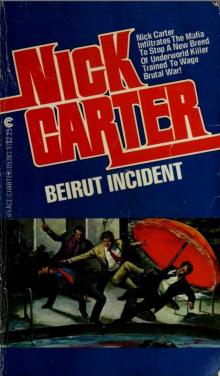 Beirut Incident
Beirut Incident White Death
White Death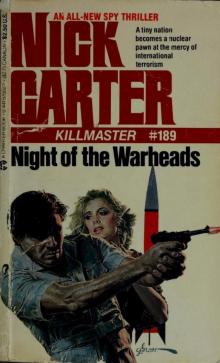 Night of the Warheads
Night of the Warheads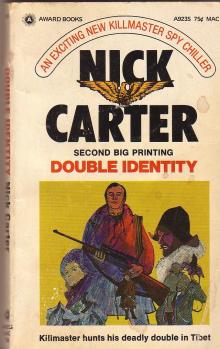 Double Identity
Double Identity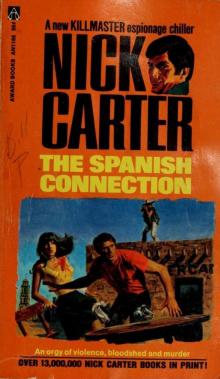 The Spanish Connection
The Spanish Connection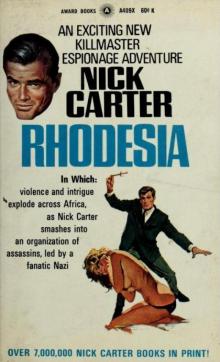 Rhodesia
Rhodesia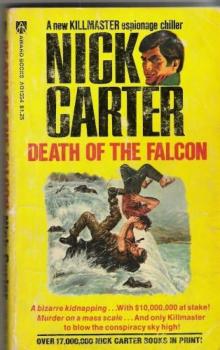 Death of the Falcon
Death of the Falcon The Executioners
The Executioners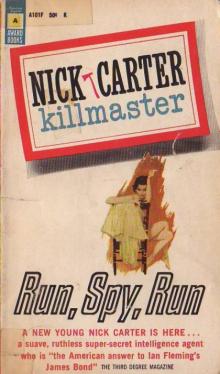 Run, Spy, Run
Run, Spy, Run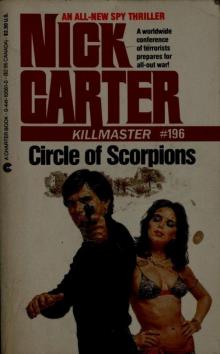 Circle of Scorpions
Circle of Scorpions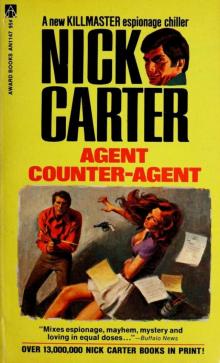 Agent Counter-Agent
Agent Counter-Agent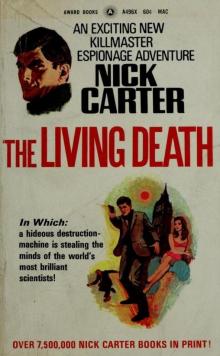 The Living Death
The Living Death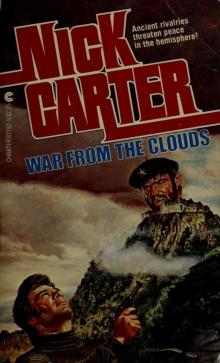 War From The Clouds
War From The Clouds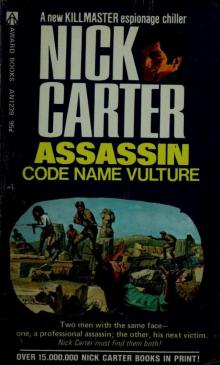 Assassin: Code Name Vulture
Assassin: Code Name Vulture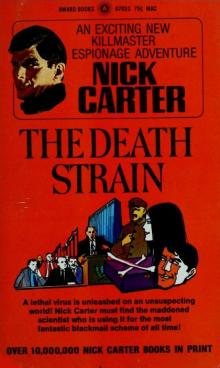 The Death Strain
The Death Strain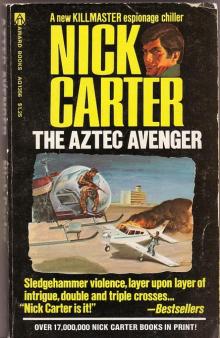 The Aztec Avenger
The Aztec Avenger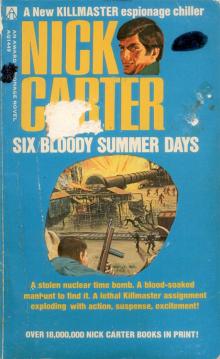 Six Bloody Summer Days
Six Bloody Summer Days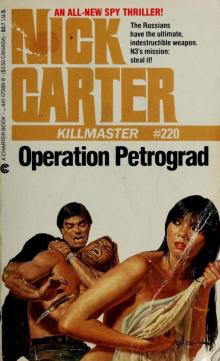 Operation Petrograd
Operation Petrograd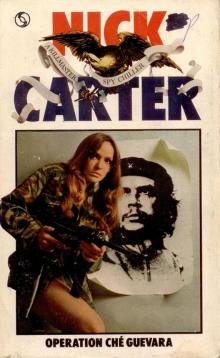 Operation Che Guevara
Operation Che Guevara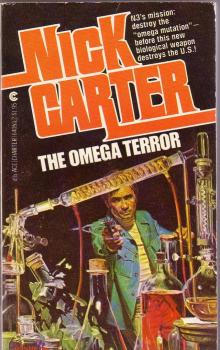 The Omega Terror
The Omega Terror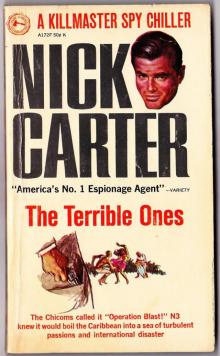 The Terrible Ones
The Terrible Ones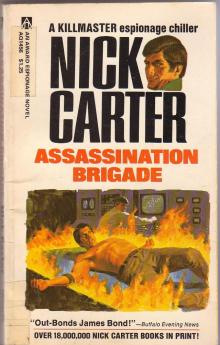 Assassination Brigade
Assassination Brigade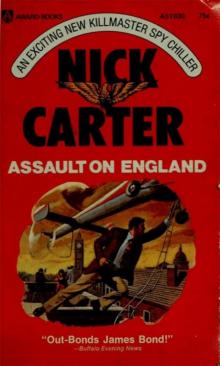 Assault on England
Assault on England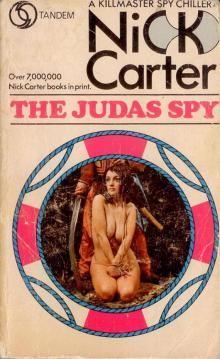 The Judas Spy
The Judas Spy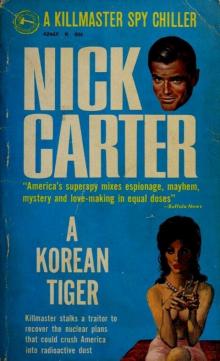 A Korean Tiger
A Korean Tiger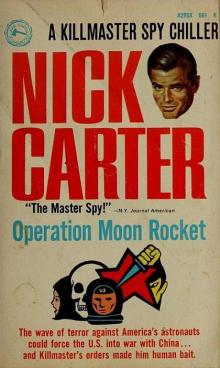 Operation Moon Rocket
Operation Moon Rocket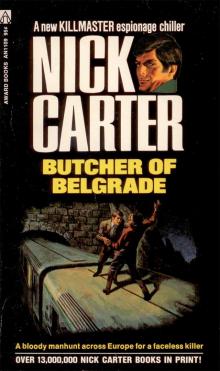 Butcher of Belgrade
Butcher of Belgrade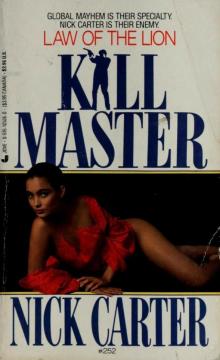 Law of the Lion
Law of the Lion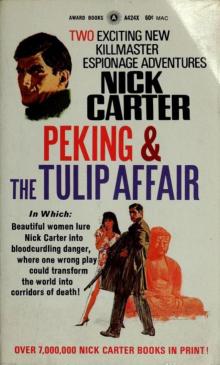 Peking & The Tulip Affair
Peking & The Tulip Affair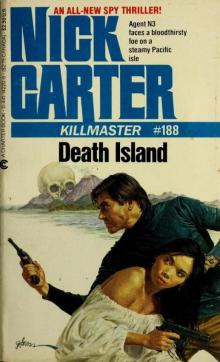 Death Island
Death Island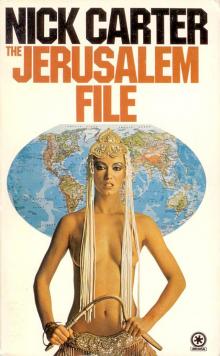 The Jerusalem File
The Jerusalem File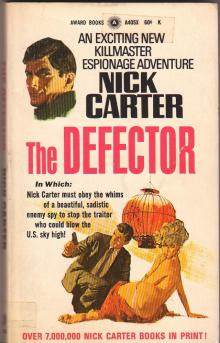 The Defector
The Defector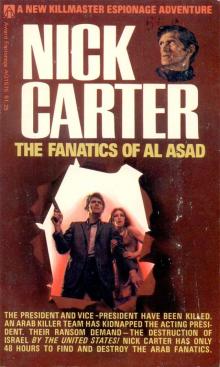 The Fanatics of Al Asad
The Fanatics of Al Asad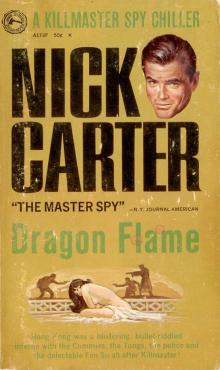 Dragon Flame
Dragon Flame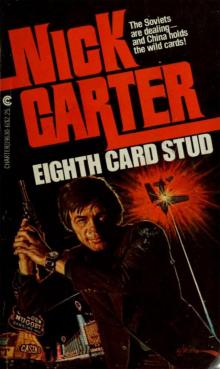 Eighth Card Stud
Eighth Card Stud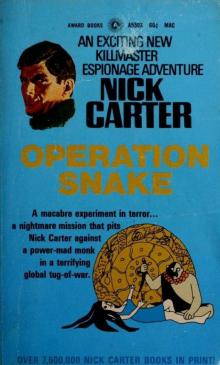 Operation Snake
Operation Snake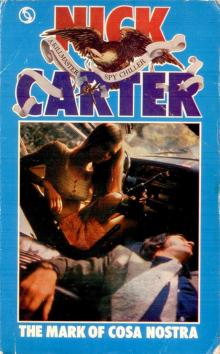 The Mark of Cosa Nostra
The Mark of Cosa Nostra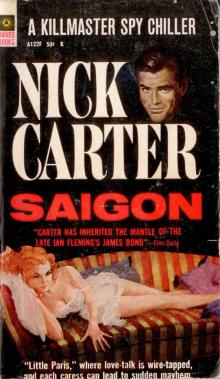 Saigon
Saigon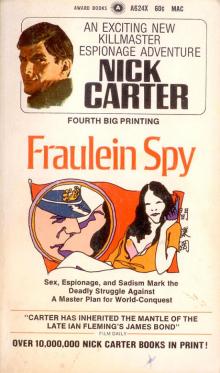 Fraulein Spy
Fraulein Spy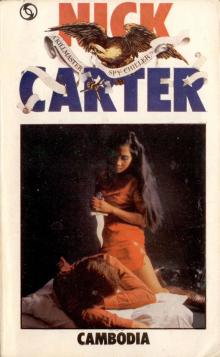 Cambodia
Cambodia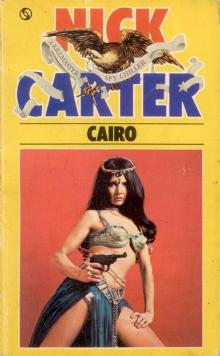 Cairo
Cairo